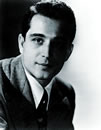By Carl Zebrowski
Americans caught up in World War II didn’t care much for anything German, for fair enough reasons, but there was one exception: the German ballad “Lili Marlene.” Everyone everywhere loved “Lili Marlene,” and by war’s end, it was the most popular song in the world.
 The minor German poet Hans Leip created the character Lili Marlene in 1915, just before he left home to fight on the Russian front in World War I. Combining the names of his girlfriend, Lili, and another woman he admired, Marlene, Leip wrote a wishful poem in German about a soldier dreaming of Lili Marlene waiting faithfully for him to return from war. The work went unpublished for 22 years before it finally appeared in a book of Leip’s poetry. The German composer Norbert Schultz put the words to music, and in 1939 the German-born singer Lale Anderson made the first recording. A less-than-impressive 700 copies sold.
The minor German poet Hans Leip created the character Lili Marlene in 1915, just before he left home to fight on the Russian front in World War I. Combining the names of his girlfriend, Lili, and another woman he admired, Marlene, Leip wrote a wishful poem in German about a soldier dreaming of Lili Marlene waiting faithfully for him to return from war. The work went unpublished for 22 years before it finally appeared in a book of Leip’s poetry. The German composer Norbert Schultz put the words to music, and in 1939 the German-born singer Lale Anderson made the first recording. A less-than-impressive 700 copies sold.
The song’s fortunes soon improved. When the Nazis took Yugoslavia in 1941, the new director of Radio Belgrade played Anderson’s recording for a friend in Erwin “the Desert Fox” Rommel’s Africa Korps. The Fox himself heard the broadcast and immediately took to the tune. In characteristic Nazi fashion, he ordered it played every night, and the song became the station’s signature sign-off at 9:55 p.m. In no time, German soldiers all around the Mediterranean were singing it. Allied soldiers, too, heard the broadcasts and were just as captivated, though they often sang their own made-up English lyrics (some that could not be printed in a family publication, no doubt).
Back in Germany, Nazi propaganda chief Joseph Goebbels ranted about banning the song because he didn’t like its characters and it wasn’t a march. Since the main characters were a soldier and a woman who remained faithful to him, and the rhythm as Anderson performed it was a march, albeit a slow one, it seems what really bothered Goebbels was that Anderson associated with Jews and openly criticized the Nazis. With such helpful negative publicity, the song’s fate as a classic was all but sealed.
 Americans on the home front first heard “Lili Marlene” on April 29, 1943, when they went to the movies and saw The March of Time, the weekly Time magazine newsreel that was shown before feature films. They listened to the faceless March of Time Orchestra and Chorus accompany the apocryphally named vocalist Jack Smith. The following year, a few popular American singers recorded the tune. Perry Como, crooning English lyrics written by Tommy Connor in his trademark smooth baritone, enjoyed the most success. Meanwhile, the husky, testosterone-tinged voice of the German-born, Nazi-hating actress Marlene Dietrich spread the tune all over the states in radio performances and live shows.
Americans on the home front first heard “Lili Marlene” on April 29, 1943, when they went to the movies and saw The March of Time, the weekly Time magazine newsreel that was shown before feature films. They listened to the faceless March of Time Orchestra and Chorus accompany the apocryphally named vocalist Jack Smith. The following year, a few popular American singers recorded the tune. Perry Como, crooning English lyrics written by Tommy Connor in his trademark smooth baritone, enjoyed the most success. Meanwhile, the husky, testosterone-tinged voice of the German-born, Nazi-hating actress Marlene Dietrich spread the tune all over the states in radio performances and live shows.
Over the decades, countless artists have offered their takes on “Lili Marlene” in dozens of languages. A box set from the small German label Bear Family Records collects enough interpretations of the song to sate the most obsessive musicologist. A mind-numbing 193 tracks fill seven CDs. A classic indeed.
Copyright 310 Publishing, LLC. All rights reserved.


FOLLOW US »
